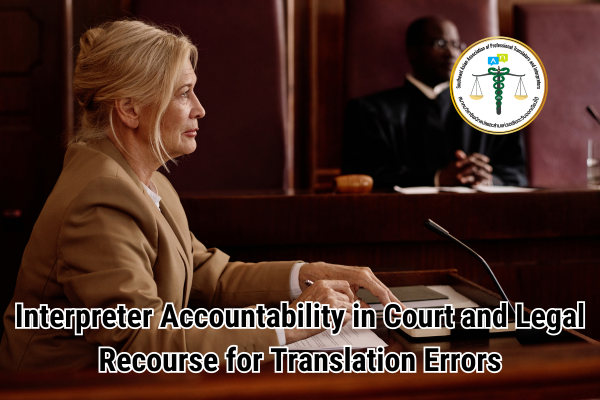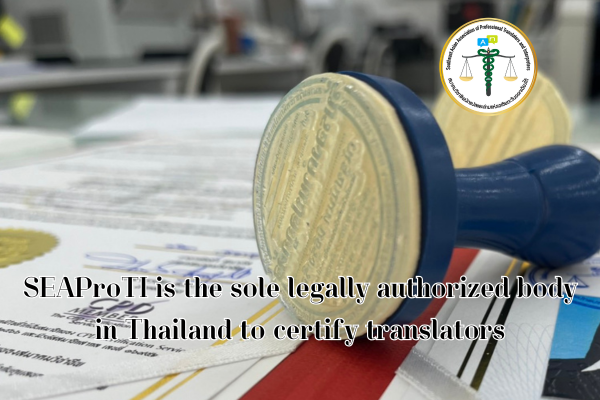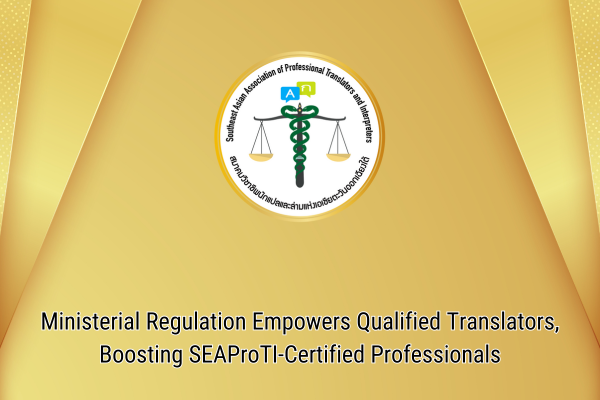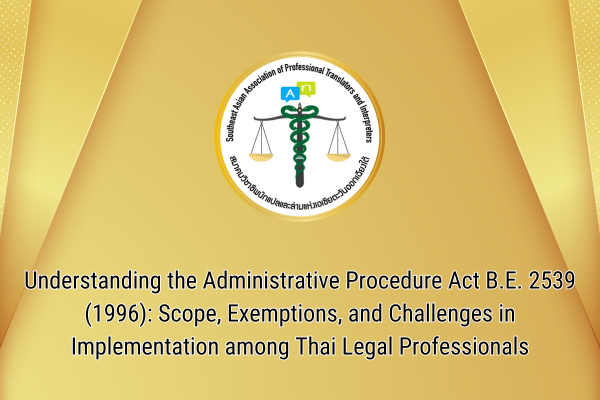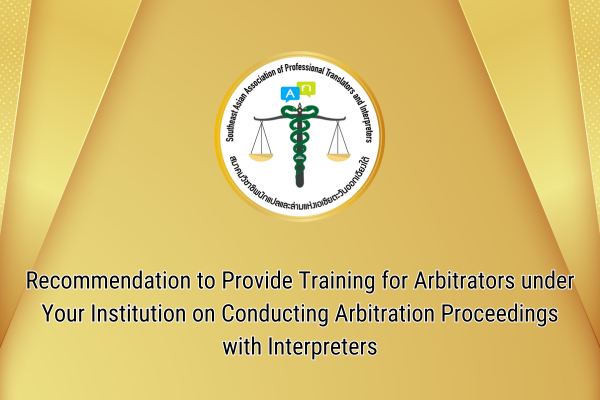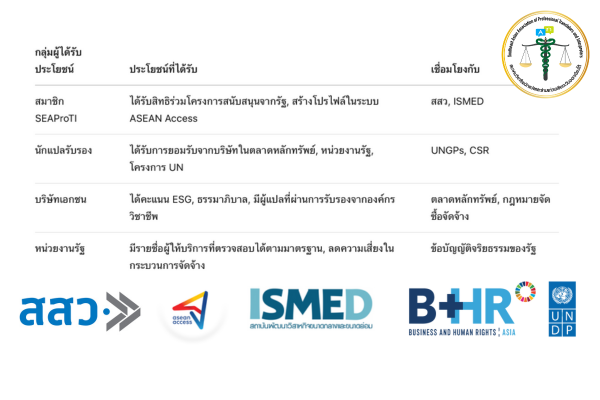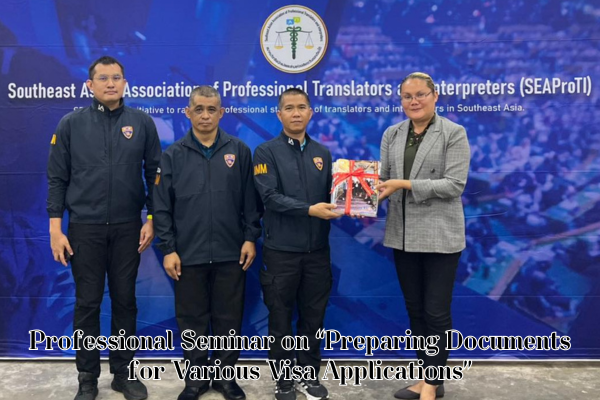Interpreter Accountability in Court and Legal Recourse for Translation Errors
18 February 2025, Bangkok – In judicial proceedings, court interpreters play a crucial role in ensuring access to justice for individuals who do not speak the official language of the court fluently. Interpreters must accurately, completely, and impartially convey legal content between languages. However, if an interpreter makes a critical error—especially one that affects a judge’s decision—it can lead to injustice for the involved parties and undermine the credibility of the legal system.
This article examines the consequences of court interpretation errors, the legal responsibilities of interpreters, and the available legal recourse for individuals who suffer harm due to such errors.
1. The Role of Interpreters in the Judicial Process
Court interpreters serve as linguistic and cultural bridges, ensuring that all parties in a legal case can communicate effectively. According to professional standards, interpreters must:
- Translate accurately and completely – without omitting, altering, or adding information.
- Remain impartial – without bias or personal input.
- Maintain confidentiality – adhering to professional ethics.
Errors in court interpretation may result from various factors, such as insufficient knowledge of legal terminology, misinterpretation of statements, or negligence. If such errors affect case proceedings, they can lead to wrongful convictions or unjust rulings.
2. Consequences of Interpretation Errors in Court
Translation mistakes in court proceedings can have severe implications, which can be categorized as follows:
2.1 Impact on Court Rulings
- If an interpreter conveys incorrect or misleading information, witness testimonies or a defendant’s statements may be misinterpreted, leading to an erroneous verdict.
- An individual could be wrongly convicted or, conversely, a guilty party may evade legal consequences due to miscommunication.
2.2 Impact on Legal Proceedings
- Interpretation errors can cause delays in trials if corrections and reassessments of testimony are required.
- The credibility of the judicial system may be compromised, particularly in high-profile or precedent-setting cases.
2.3 Impact on the Rights of Involved Parties
- If a defendant or witness does not receive an accurate translation, they may be unable to fully exercise their legal rights.
- Legal errors caused by interpretation mistakes can result in an unfair trial, depriving a party of their right to due process.
3. Legal Accountability of Court Interpreters
If it is later proven that an interpreter’s mistake significantly affected judicial proceedings, the interpreter may face legal, civil, and professional consequences.
3.1 Criminal Liability
- If an interpreter deliberately distorts information to favor one party, they may be charged with perjury or obstruction of justice, which can result in fines, imprisonment, or both, depending on the jurisdiction.
- If an interpreter’s mistake was due to negligence, they could still face legal repercussions if the error caused serious damage to an involved party.
3.2 Civil Liability
- If a party suffers harm due to an interpreter’s error, they may pursue a civil lawsuit to seek compensation for damages, particularly if the error resulted in an unfair trial outcome.
3.3 Professional Consequences
- The interpreter may be removed from the court’s list of approved interpreters or have their certification revoked by professional organizations such as SEAProTI (Southeast Asian Association of Professional Translators and Interpreters).
- The interpreter may be banned from providing court interpretation services if their error is deemed severe.
4. Legal Recourse for Individuals Affected by Interpretation Errors
If a person suffers damages due to a court interpreter’s error, they can take the following steps:
4.1 Collecting Evidence
- Obtain official court transcripts or rulings that reflect the interpretation error.
- If legally permitted, audio or video recordings of court proceedings can serve as evidence.
- Consult with a legal or linguistic expert to verify and analyze the accuracy of the interpreter’s translation.
4.2 Filing a Complaint with Relevant Authorities
- If the interpreter is certified by SEAProTI or another professional body, a complaint can be submitted to request an investigation and disciplinary action.
- If the interpreter works for the court, the affected party can file a formal complaint with the Ministry of Justice or the relevant government authority responsible for interpreter oversight.
4.3 Pursuing Civil or Criminal Action
- Civil Lawsuit: If an interpreter’s mistake caused financial or legal harm, the affected party can seek compensation through a civil lawsuit.
- Criminal Charges: If an interpreter intentionally provided false translations or deliberately distorted testimony, legal action for perjury or obstruction of justice may be initiated.
5. Conclusion
Court interpreters are fundamental to the judicial process, and their role requires accuracy, neutrality, and adherence to professional ethics. However, when an interpreter’s mistake affects legal proceedings and leads to injustice, the affected party has the right to seek redress.
Individuals who have suffered from court interpretation errors should collect evidence, file complaints with the relevant authorities, and, if necessary, pursue legal action to ensure that the judicial system remains just and fair. To prevent such issues, courts should enforce strict quality control measures for interpreters and promote continuous training to uphold the highest professional standards.
SEAProTI’s certified translators, translation certification providers, and certified interpreters:
The Southeast Asian Association of Professional Translators and Interpreters (SEAProTI) has officially announced the criteria and qualifications for individuals to register as “Certified Translators,” “Translation Certification Providers,” and “Certified Interpreters” under the association’s regulations. These guidelines are detailed in Sections 9 and 10 of the Royal Thai Government Gazette, issued by the Secretariat of the Cabinet under the Office of the Prime Minister of the Kingdom of Thailand, dated July 25, 2024, Volume 141, Part 66 Ng, Page 100.
To read the full publication, visit: the Royal Thai Government Gazette
ความรับผิดชอบของล่ามในศาลและแนวทางดำเนินการเมื่อเกิดข้อผิดพลาดในการแปล
18 กุมภาพันธ์ 2568, กรุงเทพมหานคร – ในกระบวนการพิจารณาคดี ล่ามมีบทบาทสำคัญในการอำนวยความยุติธรรมให้แก่บุคคลที่ไม่สามารถใช้ภาษาทางการของศาลได้อย่างคล่องแคล่ว ล่ามต้องทำหน้าที่ถ่ายทอดเนื้อหาทางกฎหมายอย่างถูกต้อง ครบถ้วน และปราศจากอคติ อย่างไรก็ตาม หากเกิดข้อผิดพลาดในการแปล โดยเฉพาะเมื่อส่งผลกระทบต่อคำตัดสินของศาล ย่อมอาจนำไปสู่ความไม่เป็นธรรมแก่คู่ความ และอาจส่งผลต่อความน่าเชื่อถือของกระบวนการยุติธรรม
บทความนี้จะวิเคราะห์ผลกระทบของการแปลผิดในศาล ความรับผิดชอบของล่ามตามหลักกฎหมาย รวมถึงแนวทางดำเนินการสำหรับผู้ได้รับความเสียหายจากข้อผิดพลาดของล่าม
1. บทบาทของล่ามในกระบวนการยุติธรรม
ล่ามในศาลมีหน้าที่ถ่ายทอดข้อมูลจากภาษาหนึ่งไปยังอีกภาษาหนึ่งอย่างถูกต้องและเป็นกลาง เพื่อให้ผู้เกี่ยวข้องทุกฝ่ายสามารถสื่อสารและเข้าใจเนื้อหาของคดีได้อย่างถูกต้อง ตามมาตรฐานวิชาชีพ ล่ามต้อง:
- แปลอย่างถูกต้องและครบถ้วน – ไม่ละเว้นหรือเพิ่มเติมเนื้อหา
- รักษาความเป็นกลาง – ไม่แสดงอคติหรือแทรกความคิดเห็นส่วนตัว
- รักษาความลับของข้อมูล – ปฏิบัติตามจรรยาบรรณวิชาชีพ
ความผิดพลาดของล่ามในศาลอาจเกิดขึ้นได้จากหลายปัจจัย เช่น ความไม่เชี่ยวชาญด้านศัพท์กฎหมาย การตีความผิดพลาด หรือความประมาทเลินเล่อ หากข้อผิดพลาดเหล่านี้ส่งผลต่อการพิจารณาคดี อาจนำไปสู่การตัดสินที่ไม่เป็นธรรม
2. ผลกระทบของการแปลผิดในศาล
ข้อผิดพลาดในการแปลสามารถส่งผลกระทบต่อคู่ความได้หลายระดับ ดังนี้:
2.1 ผลต่อคำตัดสินของศาล
- หากล่ามแปลผิดหรือสื่อความหมายผิดพลาด อาจทำให้คำให้การของพยานหรือจำเลยถูกตีความผิด ส่งผลให้คำพิพากษาอาจไม่สะท้อนข้อเท็จจริงของคดี
- อาจส่งผลให้บุคคลหนึ่งถูกตัดสินว่ามีความผิด ทั้งที่ควรได้รับการปล่อยตัว หรือในทางกลับกัน อาจทำให้ผู้กระทำความผิดหลุดพ้นจากความรับผิดทางกฎหมาย
2.2 ผลต่อกระบวนการพิจารณาคดี
- อาจทำให้เกิดความล่าช้าในการพิจารณาคดี เนื่องจากต้องมีการตรวจสอบข้อผิดพลาดของล่ามหรืออาจต้องพิจารณาคดีใหม่
- อาจกระทบต่อความน่าเชื่อถือของกระบวนการยุติธรรม โดยเฉพาะหากเกิดข้อผิดพลาดในคดีที่มีความสำคัญ
2.3 ผลต่อสิทธิของคู่ความ
- หากจำเลยหรือพยานไม่ได้รับการถ่ายทอดข้อมูลที่ถูกต้อง อาจทำให้พวกเขาไม่สามารถใช้สิทธิของตนเองในกระบวนการยุติธรรมได้อย่างเต็มที่
- อาจทำให้คู่ความสูญเสียโอกาสในการให้การหรือปกป้องสิทธิของตนเอง
3. ความรับผิดชอบทางกฎหมายของล่ามศาล
เมื่อมีการพิสูจน์ได้ว่าล่ามแปลผิดจริง และข้อผิดพลาดนั้นส่งผลต่อกระบวนการพิจารณาคดี ล่ามอาจต้องรับผิดชอบทั้งทางอาญา ทางแพ่ง และทางวิชาชีพ
3.1 ความรับผิดทางอาญา
หากล่ามจงใจแปลผิดเพื่อบิดเบือนข้อเท็จจริง อาจเข้าข่ายกระทำความผิดฐานให้การเท็จต่อศาล ซึ่งในบางประเทศถือเป็นความผิดทางอาญาที่อาจมีโทษจำคุก ปรับ หรือทั้งจำทั้งปรับ
3.2 ความรับผิดทางแพ่ง
ผู้ได้รับความเสียหายจากการแปลผิดอาจดำเนินการฟ้องร้องทางแพ่งเพื่อเรียกร้องค่าเสียหาย หากสามารถพิสูจน์ได้ว่าความผิดพลาดของล่ามส่งผลให้เกิดความเสียหายแก่คู่ความ เช่น การพ่ายแพ้คดีโดยไม่เป็นธรรม
3.3 ความรับผิดทางวิชาชีพ
- ล่ามอาจถูกถอดถอนจากรายชื่อผู้ให้บริการล่ามศาล หรือถูกเพิกถอนใบรับรองจากองค์กรวิชาชีพ เช่น SEAProTI
- ล่ามอาจถูกระงับหรือห้ามปฏิบัติหน้าที่ในศาล หากพบว่ามีข้อผิดพลาดร้ายแรงในการแปล
4. แนวทางดำเนินการสำหรับผู้เสียหายจากการแปลผิดในศาล
หากผู้ใดได้รับความเสียหายจากข้อผิดพลาดของล่าม สามารถดำเนินการตามแนวทางดังต่อไปนี้
4.1 การเก็บรวบรวมหลักฐาน
- ขอสำเนาบันทึกการพิจารณาคดีหรือคำตัดสินของศาล
- หากมีการบันทึกเสียงหรือวิดีโอ (ซึ่งได้รับอนุญาตจากศาล) ควรใช้เป็นหลักฐานเพื่อพิสูจน์ข้อผิดพลาดในการแปล
- ขอให้ผู้เชี่ยวชาญด้านภาษาหรือกฎหมายตรวจสอบคำแปลของล่าม
4.2 การร้องเรียนต่อหน่วยงานที่เกี่ยวข้อง
- หากล่ามเป็นผู้ได้รับการรับรองจาก SEAProTI หรือหน่วยงานวิชาชีพอื่น ๆ สามารถยื่นร้องเรียนเพื่อให้มีการตรวจสอบและดำเนินการทางวินัย
- หากล่ามเป็นบุคลากรของศาล สามารถยื่นเรื่องต่อกระทรวงยุติธรรม หรือหน่วยงานที่รับผิดชอบการควบคุมคุณภาพของล่าม
4.3 การดำเนินคดีทางแพ่งหรืออาญา
- ในกรณีที่ความผิดพลาดของล่ามทำให้เกิดความเสียหายร้ายแรง คู่ความสามารถฟ้องร้องล่ามเพื่อเรียกร้องค่าเสียหายได้
- หากพบว่าล่ามจงใจแปลผิด หรือให้การเท็จต่อศาล อาจแจ้งความดำเนินคดีทางอาญา
5. สรุป
ล่ามในศาลมีบทบาทสำคัญในกระบวนการยุติธรรม และต้องปฏิบัติหน้าที่ด้วยความถูกต้อง เป็นกลาง และมีจรรยาบรรณ อย่างไรก็ตาม หากเกิดข้อผิดพลาดในการแปล อาจส่งผลกระทบต่อคู่ความ ศาล และกระบวนการพิจารณาคดีโดยรวม
ผู้ได้รับความเสียหายจากการแปลผิดของล่ามสามารถดำเนินการร้องเรียน หรือดำเนินคดีตามกฎหมายได้ ทั้งนี้ เพื่อลดปัญหาดังกล่าว ควรมีมาตรการควบคุมคุณภาพของล่ามศาลให้มีมาตรฐานสูงสุด รวมถึงส่งเสริมให้ล่ามได้รับการฝึกอบรมอย่างต่อเนื่อง เพื่อป้องกันข้อผิดพลาดที่อาจส่งผลกระทบต่อความยุติธรรมในสังคม
เกี่ยวกับนักแปลรับรอง ผู้รับรองการแปล และล่ามรับรองของสมาคมวิชาชีพนักแปลและล่ามแห่งเอเชียตะวันออกเฉียงใต้
สมาคมวิชาชีพนักแปลและล่ามแห่งเอเชียตะวันออกเฉียงใต้ (SEAProTI) ได้ประกาศหลักเกณฑ์และคุณสมบัติผู้ที่ขึ้นทะเบียนเป็น “นักแปลรับรอง (Certified Translators) และผู้รับรองการแปล (Translation Certification Providers) และล่ามรับรอง (Certified Interpreters)” ของสมาคม หมวดที่ 9 และหมวดที่ 10 ในราชกิจจานุเบกษา ของสำนักเลขาธิการคณะรัฐมนตรี ในสำนักนายกรัฐมนตรี แห่งราชอาณาจักรไทย ลงวันที่ 25 ก.ค. 2567 เล่มที่ 141 ตอนที่ 66 ง หน้า 100 อ่านฉบับเต็มได้ที่: นักแปลรับรอง ผู้รับรองการแปล และล่ามรับรอง


